 полная версия
полная версияWreaths of Friendship: A Gift for the Young
Robert thought a good deal about the old man's mention of conscience, and when he saw his father, he asked him what the conscience meant.
Robert's father liked to have his children make such inquiries, and did all that he could to encourage them in doing so.
"There are two ways, Robert," said he, "of explaining things. One is by telling what they are, directly, and the other is by telling what they do. I find that my children generally like the last of these methods better than they do the first; and I am not sure but, on the whole, it is quite as good as the other. At any rate, I shall try to describe conscience by pointing out some of its effects. In other words, I shall tell you a story. Some twenty-five years ago—it may be thirty; how time slides away!—I knew a boy who had one of the kindest of mothers, but whose father had died before his recollection. I think—indeed I know—he loved his mother, though he was sometimes thoughtless, and once in a while disobedient. One day, in midsummer, when the blackberries were ripe in the woods, and the trout were sporting merrily in the brook, Charles—for that was the name of the boy—came running to his mother, all out of breath, and said that Joseph Cone and Charley Corson had come with their baskets and fish-lines, and wanted he should go with them. 'Oh, such fine times as they are going to have, mother! Mayn't I go? Blackberries are ripe now, and there are lots of them over in Mr Simpson's woods. And oh! such splendid trout! One of the boys caught a trout last Saturday, so big that he couldn't hardly pull it out of the water! Oh, I do want to go, mother! I'll bring home a fine string of trout—I know I will. Ha! ha! ha!' And Charley danced up and down the room, and clapped his hands, and laughed very loudly at the idea, I suppose, of his outwitting the simple little fish."
Robert laughed, too, when his father came to this part of the story, and said he thought that was something like counting the chickens before they were hatched.
"Yes," continued Mr Mason; "but I am afraid that was not the worst of it, by a good deal; for Charles knew well enough that his mother wanted him at home that day, and he ought not to have urged her so hard. 'My dear,' said that kind, indulgent lady, 'I will let you do just as you choose about going. You know I want you to help me about the house to-day, and I should be very sorry to have you leave me. But I don't wish to govern you by force. I want to see you mind because you love me—not because you are obliged to. So I shall not say any more. Do as you please, this time.'
"Charles thought a moment or two. He saw plainly enough that there were two sides to the question about going a-fishing that day. His mother was not very well. He thought of that; and he thought that if he went, she would have more work to do, and perhaps she would then be quite sick. His conscience was at work, you see. 'Well,' he thought, 'I guess I will let the trout stay where they are to-day,' But just then he heard one of the boys say, 'Halloo, Charley! what do you say? We're tired of waiting. Shall we go without you, or will you come along?'
"Well, what do you think Charley did, Robert?"
"Why, he stayed at home, and helped his mother, of course."
"No, I'm sorry to say that he changed his mind, and started off with the boys. His conscience said no, but his will said yes."
"Then he did very wrong."
"So I think. But the truth must be told. Charley took his fishing apparatus, and whistled for his little dog, Caper, and away the three boys ran, toward the brook.
"'Let's go to the deep hole under the elm tree. That's where Bill Havens caught the big trout, the other day,' said one.
"Bill Havens, as they called him, was one of the most noted fishermen in the place. I knew him well. He was always sure to succeed, wherever and whenever he went out with his hook and line. I have been to this deep hole with Bill Havens, more than once, and have seen him catch half a dozen large pickerel, when I could not, by any of my skill, persuade a single fish to come out of the brook.
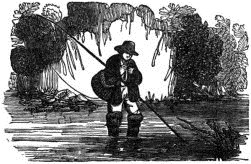
BILL HAVENS AT THE DEEP HOLE.
"'But we shall have to cross the brook,' said Charley, 'and how in the world are we going to do that? The foot-bridge was swept away by the freshet, you know.'
"'Oh, I'll see about that. I know where there's an old tree that lies clear across the stream. We can get over on that, just as well as we could over the foot-bridge,'
"And so they started for the old tree, which was to serve them for a bridge. It had been blown down by the wind, and had fallen across the stream, so that the large end rested on the side where the boys were, while the upper limbs reached the opposite bank. When the boys got to the tree, they saw that it was not quite so convenient a bridge as they could wish; and Charley Mason, who was not by any means a headstrong lad, and not used to such adventures, said he would rather not attempt to cross it. But the other two boys laughed at him, and told him not to be a coward; and he finally determined he would venture, if the others succeeded. They did succeed, and Charley, not without some trembling—which, of course, made his danger the greater—prepared to follow. 'Take care, Charley! take care! Rather dangerous business, isn't it? Cling closely to the tree. There—so. Don't look down into the water, or you'll be dizzy. That's the way. Come on, now. Don't hang on to that dry limb! It will break and let you fall into the water, if you do. How the poor fellow trembles! Plash! There he goes, I declare!'
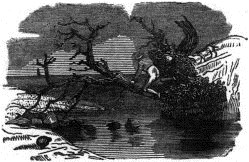
CHARLES CROSSING THE BROOK.
"Sure enough, Charles had slipped and fallen into the stream! and his companions, so frightened that they hardly knew what they did, took to their heels, and ran as fast as they could toward home!"
"Poor Charley! he was drowned, then?" said Robert.
"No, he managed to get out of the water; but he had a hard time of it, though. He could not swim very well, at the best; and with all his clothes on, it was as much as he could do to swim at all. If the river had been a little wider, he never could have got out alone. As it was, however, by the help of some rocks there were in the brook, he reached the shore, pretty thoroughly exhausted, and not a little frightened. His zeal for trout-fishing was by this time a good deal cooled off, as you may suppose. The nearest he came to catching any of those cunning little fellows that day, was when he tumbled into the brook; and then he had something else to think of.
"There he was, alone, wet as a drowned rat, and shivering, partly from cold and partly from fright, as if he had the ague. Poor fellow! His conscience began to be heard again, now he had time to think. He hardly knew what to do; he was ashamed to go home to his mother; and there he stood, for a good while, leaning his head on the fence near the water, the tears all the time chasing each other down his cheeks."
"I don't wonder he cried," said Robert; "but I can't help laughing to think what a sorry figure he must have made there, on the bank! And he was going to bring home such a nice string of fish, too! I wonder if his mother did not laugh when she saw him coming. Did he stay there, father, shivering and crying, till some body came after him?"
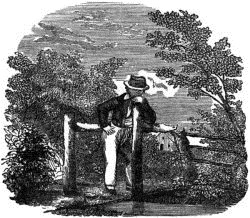
CHARLES, AFTER THE DUCKING.
"No, he started for home before any of the neighbors reached the spot where he fell into the river; and, as they missed him on the way, they supposed he was drowned, and searched for his body half an hour or more, till they learned he was safe at home."
"Well, what did his mother say to him, father?"
"She did not say much, poor woman. She was not well, as I said before, when Charles left her; and as her servant had gone away for a week, and she had no one but him to assist her in her work, she became very much fatigued; and when she heard that Charles had fallen into the river, she fainted immediately. She had hardly recovered when the boy reached the house."
"I think Charles was a very bad boy."
"Not so much worse than many others, perhaps, as you may suppose. You judge of the boy's conduct by the consequences of it. If he had been successful in his trout-fishing, and no accident had happened to his mother, you would not have thought half as much of his guilt in acting contrary to his mother's wishes."
"Certainly not."
"But the boy would have been just as bad, for all that."
"I can't see how, father."
"Why, the boy, when he was thinking what he would do about going on that fishing excursion, could not have foreseen all that would happen if he went. Do you think he could?"
"No, sir, not all, I suppose. But I am sure he was a very bad boy, whether he knew what would happen or not."
"Yes, no doubt. But I want you to see exactly where his guilt lay. It was simply in his not yielding to his mother's wish, when she so kindly left him at liberty to do as he chose; especially as he knew she was ill, and needed his assistance."
"Charley deserved a good whipping."
"Well, he was punished severely."
"Did his mother punish him?"
"No, for weeks she was too ill for that; and if she had been well, probably she would not have punished him."
"How did he get punished?"
"By his own conscience. He felt that he had done wrong, and that made him very unhappy. He saw, then, that he had been very unkind to his mother, and that his unkindness cost her pain and sorrow. He would rather have given all his playthings—every one of his toys—than to feel as he did then. Indeed, I think he would prefer the severest punishment from his mother, to the wound which his conscience inflicted. Do you understand now, my son, what is meant by conscience?"
"I think I do. When we are sorry for any thing we have done, it is the conscience that makes us feel so."
"Not always. Charles was no doubt very sorry he had tried to cross the river on the tree, because he fell into the water, and came near being drowned. But the conscience had nothing to do with this sorrow. When we see that we have carelessly or wilfully injured some one—hurt his feelings, perhaps—or when we reflect that we have disobeyed God, and feel grieved and sorry on this account, then the conscience is the cause of our pain. So you see that it is one of the numerous proofs of the wisdom and the goodness of God, that he has given mankind a conscience. Take care, my son, that you listen to its voice."
OLD NED
Not many years ago, Farmer Jones had an old horse named "Ned," who appeared to have almost as much sense as some people. Ned was a favorite with his master, who petted him as if he were a child instead of a dumb animal. The horse seemed to understand every word that the farmer said to him, and would obey him quite as readily and with as much intelligence as Rover, the house dog. If his master came into the field where he was grazing, Ned would come galloping up to meet him, and then caper round as playfully, though not, it must be owned, as gracefully, as a kitten.
Farmer Jones, on these occasions, generally had an ear or two of corn in his pocket; and Ned, whose nose had been many a time in that capacious receptacle of odds and ends, after sweeping around his master two or three times, would stop short and come sideling up, half coquetishly, yet with a knowing twinkle in his eye, and commence a search for the little tidbit that he had good reason for knowing lay snugly stored away in the pocket.
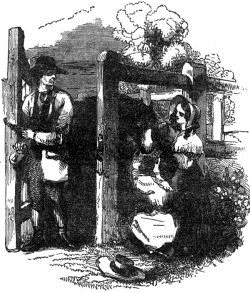
OLD NED.
If any one besides his master went into the field and tried to catch Ned, he was sure to have a troublesome time of it; and if he succeeded in his object before circling the field a dozen times in pursuit of the horse, he might think himself lucky. But a word or a motion of the hand from Farmer Jones was all-sufficient. Ned would become, instantly, as docile as a child, trot up to his side, and stand perfectly still to receive the saddle and bridle.
When Farmer Jones was on the back of Ned, or sitting behind him in the old chaise, no horse could be more even in his gait, or more orderly in all his movements. But it wasn't safe for any one else to try the experiment of riding or driving him. If he escaped without a broken neck, he might think himself exceedingly fortunate; for the moment any one but his master attempted to govern his actions in any way, he became possessed with a spirit that was sometimes more than mischievous. He would kick up, bite, wheel suddenly around, rear up on his hind feet, and do almost every thing except go ahead in an orderly way, as a respectable horse ought to have done.
Ned was too great a favorite with his master for the latter to think of trying very hard to correct him of these bad practices. He would talk to him, sometimes, about the folly of an old horse like him prancing about, and cutting up as many antics as a young colt; but his words, it was clear, went into one of Ned's ears and out of the other, as people say, for Ned did not in the least mend his manners, although he would nod his head in a knowing and obedient way, while his master was talking to him.
Ned spent at least two thirds of his time, from the period when the grass sprung up, tender and green, until it became pale and crisp with frost, in a three-acre field belonging to his master, where he ate, walked about, rolled himself on the soft sward, or slept away the hours, as happy as a horse could be. Across one corner of this field a little boy and his sister used every day to go to school. The little boy was a namesake of the horse; but he was usually called Neddy. One day Neddy felt rather mischievous, as little boys will feel sometimes. He had a long willow switch in his hand, and was cutting away at every thing that came within his reach. He frightened a brood of chickens, and laughed merrily to see them scamper in every direction; he made an old hog grunt, and a little pig squeal, and was even so thoughtless as to strike with his slender switch a little lamb, that lay close beside its mother on the soft grass.
"Don't, don't, Neddy," Jane, his sister, would say.
But the little fellow gave no heed to her words. At last, in crossing the field, they came to where the old horse lay under the shade of a great walnut tree. The temptation to let him have a taste of the switch was too strong for Neddy to resist; so he passed up close to the horse, and gave him a smart cut across the shoulders.
Now that was an indignity to which the old fellow was not prepared to submit. Why, it was at least ten years since the stroke of a whip had been felt upon his glossy skin. Whip and spur were of the times long since gone by. Springing up as quickly as if he were only a colt instead of a grave old horse, Ned elevated his mane, and swept angrily around the now frightened lad, neighing fiercely, and striking out into the air with his heels at a furious rate. Jane and Neddy ran, but the horse kept up, and by his acts threatening every moment to kill them. But, angry as the old fellow was, he did not really intend to harm the children, who at length reached the fence toward which they were flying. Jane got safely over, but just as Neddy was creeping through the bars, the horse caught hold of his loose coat, with his teeth, and pulled him back into the field, where he turned him over and over on the grass with his nose for half a dozen times, but without harming him in the least, and then let him go, and went trotting back to the cool, shady place under the old walnut tree, from which the switch of the thoughtless boy had aroused him.
Neddy, you may be sure, was dreadfully frightened, and went crying home. On the next day, when they came to the field in which Ned lived at his ease and enjoyed himself, the old horse was grazing in a far-off corner, and the children thought they might safely venture to cross over. But they had only gained half the distance, when Ned espied them, and, with a loud neigh, gave chase at full gallop. The children ran, in great alarm, for the fence, and got through, safely, before the horse came up.
After this, whenever they ventured to cross the field, Ned would interfere. Once he got Neddy's hat in his mouth, and ran off with it. But he didn't harm it any, and after keeping the children waiting at the fence for about half an hour, came and threw it over; after which he kicked up both his heels in a defiant manner, and giving a "horse laugh," scampered away as if a locomotive were after him.
At last Neddy's father complained to Farmer Jones of the way in which his old horse was annoying the children, who had to pass through the field, as they went to school, or else be compelled to go a long distance out of their way. The farmer inquired the cause of Ned's strange conduct, and learned that the little boy cut him across the shoulders with a willow switch.
"Ho! ho!" said he, "that's the trouble, is it? Ned won't bear a stroke from any one. But I will make up the matter between him and the children. So let them stop here on their way from school this evening."
The children stopped accordingly. Ned was standing in the barn-yard, the very picture of demure innocence. But when he saw little Neddy and his sister, he pricked up his ears, shook his head, and neighed.
"Come, come, old boy!" said the farmer, "we've had enough of that. You must learn to forgive and forget. The little fellow was only playing with you."
Ned appeared to understand his master, for he looked a little ashamed of himself, and let his pointed ears fall back again to their old places.
"Now, my little fellows," said Farmer Jones, "take up a handful of that sweet new hay, and call him to the bars."
"I'm afraid," returned Neddy. "He'll bite me."
"Not he. Why the old horse wouldn't harm a hair of your head. He was only trying to frighten you as a punishment for the stroke you gave him. Come. Now's your time to make friends."
Neddy, thus encouraged, gathered a handful of the sweet new hay that was scattered around, and going up to the fence, held it out and called to the horse—
"Here! Ned, Ned, Ned!"
The horse shook his head, and stood still.
"Come along, you old vagabond!" said Farmer Jones, in a voice of reproof. "Don't you see the lad's sorry for the cut he gave you? Now walk up to the bars, and forgive the little fellow, as a sensible horse ought to do."
Ned no longer hesitated, but went up to the bars, where Neddy, half trembling, awaited him, and took the sweet morsel of hay from the child's hand. Jane, encouraged by this evidence of docility, put her hand on the animal's neck, and stroked his long head gently with her hand, while Neddy gathered handful after handful of hay, and stood close by the mouth of the old horse, as he ate it with the air of one who enjoyed himself.
After that, the children could cross the field again as freely as before, and if Ned noticed them at all, it was in a manner so good natured as not to cause them the slightest uneasiness.
THE FREED BUTTERFLY
Yes, go, little butterfly, Fan the warm airWith your soft silken pinions, So brilliant and fair;A poor, fluttering prisoner No longer you'll be;There! Out of the window! You are free—you are free!Go, rest on the bosom Of some favorite flower;Go, sport in the sunlight Your brief little hour;For your day, at the longest, Is scarcely a span:Then go and enjoy it; Be gay while you can.As for me, I have something More useful to do:I must work, I must learn— Though I play sometimes, too.All your days with the blossoms, Bright thing, you may spend;They will close with the summer, Mine never shall end.JULIA AND HER BIRDS
Little Julia Cornish, a young friend of mine, is very fond of birds. It is no strange thing, I am aware, for children to love birds. Indeed, I do not see how any body can help loving the dear little things, especially those that fill the air with their music. But Julia was unusually fond of them, and her fondness showed itself in a great many ways. She did not shut them up in cages. But she was so kind to those that had their liberty, that many of them became quite as tame as if they had always lived in a cage.
I must tell you about a robin that used to be a pet of hers. You know the robin, do you not, reader? To my mind he is one of the dearest of all our native songsters. His notes are among the first we hear in the spring. And he is a very social and confiding creature. How often he selects a place for his nest on some tree near the house! and when it is built, while his partner is busy with her domestic duties, he will sing for hours together his song of love and tenderness.
Julia resided in the country; and every year the robins built their nests on the trees in her father's orchard, near the house. She fancied that the robins came from the South to her door, year after year, and brought their children with them. She was sure she could distinguish the voices of her old friends, and she used to sit under the shade of the trees where they had their nests, and talk to them kindly, and leave something good for them to eat.
One year there were a pair of robins who made their nest on a tree, the boughs of which hung over the house; and Julia could sit in her window and see all that the little family were doing. She was delighted with such a token of confidence, and she and the robins soon became very intimate. The old ones frequently flew down from their nest, and alighted near the door, when Julia would give them as much food as they wanted, and let them carry some home to their children.
By and by, the young robins were old enough to leave their nests. That was a great day with both parents and children, and all seemed about as merry as they could be when the half-fledged little birds took their first lessons in flying, though Julia laughed a good deal to see their manoeuvres, and said their motions were awkward enough. However, they learned to fly after a while, as well as their parents, though before they left for the season, some cruel boy threw a stone at one of them and broke his wing. Poor fellow! he suffered a great deal of pain, and his parents and brothers and sisters were very sad about it. They seemed for a while hardly to know what to do. Probably there were no surgeons among them, who understood how to manage broken limbs. And they had a long talk together—so Julia said—and finally hit upon this plan. Willy—that was the name my friend gave to the lame bird—was to go into the house, and see if something could not be done for him there.
Accordingly, one bright morning in June, almost as soon as breakfast was over, the little invalid, attended by the rest of the family, came to the door, where Julia was waiting to receive them—for she fed them regularly every day—and then, after they had eaten what they wanted, instead of flying away, as they were accustomed to do, little Willy hopped into the kitchen, while the rest remained near the door. Julia thought that was queer enough, and she ran and told her mother. "I wonder if I can coax the little fellow to stay with me until his wing gets well," she said. "I wish I could. Oh, I should dearly love to take care of him, and I am sure we can make him well soon."
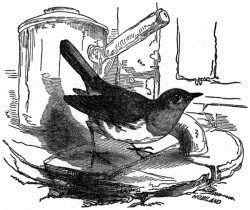
JULIA'S PET ROBIN.
Little Willy did not say—at least he did not say in our language—that he should be happy to place himself awhile under his friend Julia's care. But he seemed very content, and soon made himself quite at home. Though he had perfect liberty to go just where he pleased, and would often venture out of the house, yet he evidently considered himself an inmate of Mr Cornish's family. Under the care especially of Miss Julia, he became so tame that she could take him in her lap and stroke his feathers. Willy was a great favorite in the family, after he had been there a day or two. No one did any thing for his wing. They did not understand setting birds' wings, when they were broken. Still, Willy got better in a very short time, without the assistance of a surgeon. A great many sick people, you know, need the care of a nurse more than that of a doctor. That was the case with Willy, it would seem. In less than three weeks his wing was entirely well, and he was able to take care of himself. So he warbled his adieu to the family under whose roof he had been so kindly treated, and flew away with the other robins who had been waiting for him.









